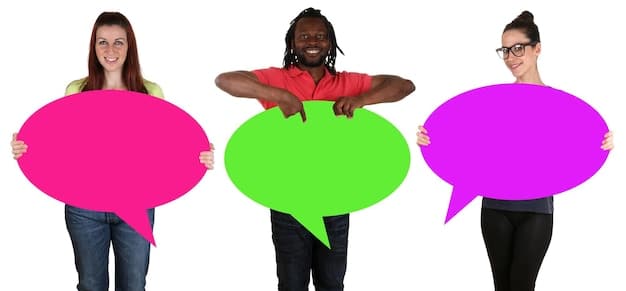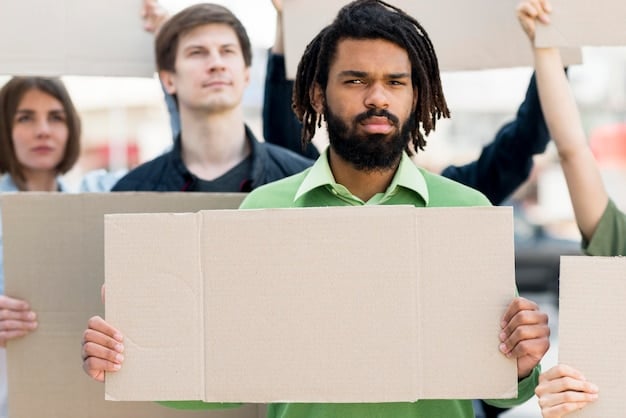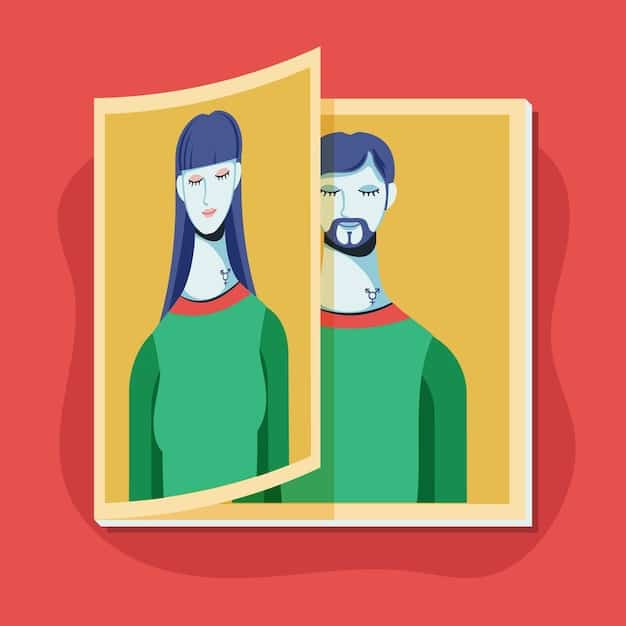Is Cancel Culture Shaping American Discourse Positively or Negatively?

Cancel culture, a modern form of public shaming, significantly impacts American discourse by altering the boundaries of acceptable speech and accountability, raising debates about its overall societal effects on free expression and justice.
Has **cancel culture** transformed American discourse for better or worse? This phenomenon, characterized by public shaming and boycotts, raises critical questions about its influence on free speech, accountability, and social progress.
The Origins and Evolution of Cancel Culture
Cancel culture, a contemporary term, encompasses a form of public ostracism triggered by perceived offensive or inappropriate actions or statements. Understanding its roots and progression can help us evaluate its impact on American discourse.
Early Forms of Social Ostracism
Social ostracism isn’t new. Throughout history, societies have used shaming and exclusion to enforce norms and punish deviance. Recognizing these historical precedents provides context for understanding modern cancel culture.
The Digital Age and Amplified Impact
The internet, particularly social media, has amplified the reach and speed of public shaming. What once might have been a local issue can now gain global attention in moments, profoundly affecting individuals and institutions.
- Examine how platforms like Twitter and Facebook contribute to the rapid spread of information and the formation of public opinion.
- Discuss the role of algorithms in amplifying content, potentially leading to targeted campaigns against individuals.
- Explore cases where online shaming has had real-world consequences, such as job loss or social isolation.
It’s essential to examine the mechanisms by which digital platforms accelerate social reactions and the potential for disproportionate consequences.
Arguments for Cancel Culture: Accountability and Social Justice
For proponents, cancel culture serves as a tool for accountability, especially when traditional systems fail to address harmful behavior. Does it effectively promote social justice and empower marginalized voices?
Holding Individuals Accountable
Advocates argue that cancel culture deters misconduct by imposing social and professional consequences. When institutions are slow to act, public pressure can force recognition and remediation of harmful behaviors.
Empowering Marginalized Voices
Cancel culture can provide a platform for those traditionally silenced. It allows marginalized groups to challenge dominant narratives and demand justice for injustices they experience.

- Detail how cancel culture has been used to address issues of racism, sexism, and other forms of discrimination.
- Explore examples where public pressure has led to meaningful changes in organizational policies and practices.
- Discuss the concept of restorative justice as an alternative or complement to punitive approaches.
Examining the effectiveness of cancel culture as a tool for social justice requires evaluating both its successes and its limitations.
Arguments Against Cancel Culture: Free Speech and Mob Mentality
Critics argue that cancel culture infringes on free speech and often devolves into online mob behavior, stifling open dialogue and promoting conformity. Is there a chilling effect on public discourse?
The Chilling Effect on Free Speech
Some worry that the fear of public shaming discourages open expression and critical thinking. People may self-censor to avoid controversy, leading to a narrower range of acceptable opinions.
The Dangers of Mob Mentality
Online pile-ons can be disproportionate and unjust, fueled by misinformation and lacking due process. The speed and intensity of social media reactions can overwhelm individuals, regardless of the validity of accusations.
The potential for cancel culture to create an environment of fear and conformity raises significant concerns about the health of public discourse.
The Impact on Dialogue and Debate
Cancel culture’s effects on American dialogue and debate are complex, altering the dynamics of conversation and engagement. How has it changed the way we communicate and address disagreements?
Polarization and Division
Has cancel culture deepened social divides by creating echo chambers and reinforcing existing biases? Does it hinder constructive dialogue by framing issues as purely good versus evil?
Shifting Boundaries of Acceptable Speech
Cancel culture has undeniably reshaped the boundaries of acceptable speech, raising questions about where to draw the line between offensive and legitimate viewpoints. Are these boundaries evolving in a positive or negative direction?

- Investigate the role of media in shaping perceptions of cancel culture and its impact on public opinion.
- Analyze how different generations view and engage with cancel culture.
- Discuss the potential for cancel culture to be weaponized for political or ideological gain.
Understanding the nuances of cancel culture’s impact on dialogue and debate requires careful consideration of its effects on polarization, free speech, and the evolving standards of acceptable expression.
Case Studies: High-Profile Cancellations and Their Aftermath
Examining specific cases of high-profile cancellations can provide insights into the dynamics and consequences of this phenomenon. What lessons can be learned from these examples?
Analyzing Specific Cases
Detailed analyses of individual cancellations can reveal patterns and complexities often overlooked in simplified narratives. These case studies offer concrete examples of the effects of public shaming on individuals and institutions.
Lessons Learned
What are the common threads and key takeaways from these high-profile incidents? Can we identify best practices for navigating controversial situations and fostering more constructive dialogue?
Thoughtful analysis of case studies is crucial for developing a more informed understanding of the complexities and consequences of cancel culture.
Finding a Path Forward: Constructive Discourse and Accountability
Moving forward, how can we foster constructive discourse and ensure accountability without stifling free speech or promoting mob mentality? Is there a middle ground?
Promoting Empathy and Understanding
Encouraging empathy, active listening, and a willingness to understand different perspectives can help bridge divides and create a more productive environment for dialogue.
Balancing Accountability and Forgiveness
Finding the right balance between holding individuals accountable for their actions and offering opportunities for redemption is essential. How can we create systems that promote both justice and forgiveness?
Navigating the complexities of cancel culture requires a commitment to open dialogue, critical thinking, and a willingness to find common ground.
| Key Point | Brief Description |
|---|---|
| 📣 Accountability | Cancel culture is seen by some as a tool for holding individuals accountable for harmful actions. |
| 🗣️ Free Speech | Critics argue cancel culture stifles free speech and promotes self-censorship. |
| ⚖️ Polarization | Cancel culture can deepen social divides by reinforcing biases. |
| 🤝 Constructive Discourse | Empathy and understanding are vital for fostering constructive dialogue. |
FAQ
▼
Cancel culture refers to a modern form of ostracism in which an individual or group is publicly shamed and boycotted, usually on social media, for perceived offensive actions or statements.
▼
Critics argue that cancel culture can stifle free speech by creating a climate of fear, leading individuals to self-censor to avoid backlash or public shaming.
▼
Proponents argue that it holds individuals accountable for harmful behavior, empowers marginalized voices, and promotes social justice when traditional systems fail to do so.
▼
Yes, cancel culture can deepen social divides by creating echo chambers where individuals are primarily exposed to opinions that reinforce their existing biases.
▼
Fostering empathy, promoting active listening, and encouraging open dialogue can help bridge divides and create an environment for more productive conversations about sensitive issues.
Conclusion
Ultimately, the question of whether **cancel culture** is changing American discourse for better or worse is complex and multifaceted. While intended to promote accountability and social justice, it also presents risks to free speech and open dialogue. Finding a balance between these competing values is crucial for fostering a healthy and productive public sphere in the United States.





